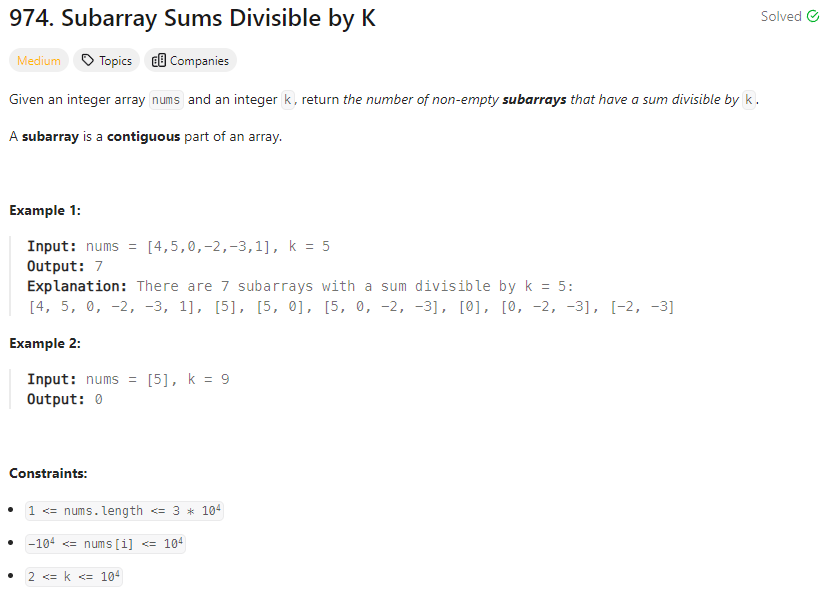Problem of The Day: Subarray Sums Divisible by K
Problem Statement

Intuition
My first thought to solve this problem was to utilize the prefix sum approach. This technique allows me to keep track of the cumulative sum of the elements in the array, which can be very useful for identifying subarrays that meet certain criteria. The key idea here is to use the modulo operation to determine when a subarray sum is divisible by ( k ).
Approach
To solve this problem, I followed these steps:
- I initialized a dictionary
prefix_sumto keep track of the counts of different modulo values of the cumulative sums. - I also initialized
curr_sumto store the current cumulative sum andresto store the result, which is the count of subarrays whose sum is divisible by ( k ). - I iterated over each element in the array, updating the cumulative sum
curr_sumat each step. - I calculated the modulo value
mod_valof the current cumulative sum with ( k ). - If
mod_valis zero, it means the subarray from the beginning to the current index is divisible by ( k ), so I incremented the resultres. - If
mod_valhas been seen before (exists inprefix_sum), it means there are subarrays ending at the current index that have a sum divisible by ( k ), so I added the count of these subarrays tores. - I updated the count of the current
mod_valin theprefix_sumdictionary. - Finally, I returned the result
res.
Complexity
- Time complexity: The time complexity of this approach is ( O(n) ), where ( n ) is the length of the input array. This is because we iterate through the array once.
- Space complexity: The space complexity is ( O(k) ), which is the maximum number of different modulo values we can have. In the worst case, it is ( O(k) ).
Code
class Solution:
def subarraysDivByK(self, nums: List[int], k: int) -> int:
n = len(nums)
prefix_sum = defaultdict(int)
curr_sum = 0
res = 0
for i in range(n):
curr_sum += nums[i]
mod_val = curr_sum % k
if mod_val == 0:
res += 1
if mod_val in prefix_sum:
res += prefix_sum[mod_val]
prefix_sum[mod_val] += 1
return res
Editorial
class Solution {
public:
int subarraysDivByK(vector<int>& nums, int k) {
int n = nums.size();
int prefixMod = 0, result = 0;
// There are k mod groups 0...k-1.
vector<int> modGroups(k);
modGroups[0] = 1;
for (int num : nums) {
// Take modulo twice to avoid negative remainders.
prefixMod = (prefixMod + num % k + k) % k;
// Add the count of subarrays that have the same remainder as the current
// one to cancel out the remainders.
result += modGroups[prefixMod];
modGroups[prefixMod]++;
}
return result;
}
};
- time: O(n + k) where n is the length of
numsand k is the given integer - space: O(k)